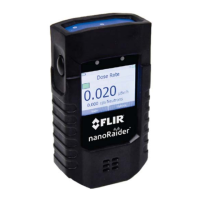1.6. Instrument Description and Application Overview FLIR Detection
1.6 Instrument Description and Application Overview
The FLIR identiFINDER R300 can be described as a small but powerful computer with keyboard
and LCD screen further equipped with dedicated detectors for gamma and neutron radiation plus
some auxiliary sensors such as a receiver for the NAVSTAR global positioning system (GPS). All data
acquired by the sensors are recorded, processed and evaluated by a sophisticated software that
discriminates innocent from threatening radiation even when operated by personnel with minimal
training.
A general outline of the FLIR identiFINDER R300’s functional elements is given in Figure 4, p. 25,
while Figure 5, p. 26 helps to identify and locate the various components of the instrument.
• A microcomputer shown in the center of Figure 4, p. 25 is the central element of the FLIR
identiFINDER R300. It is connected to various peripherals for input, output, and communi-
cation.
• Green circles in the upper left part of Figure 4, p. 25 represent input peripherals including the
keys and, most prominently, the sensors for radioactive radiation:
– A cadmium zinc telluride (CZT, CdZnTe) semiconductor crystal to record gamma radia-
tion spectra
– Two CdZnTe crystals for dose rate measurements
– A
3
He detector for neutron radiation (optional)
• Output of the FLIR identiFINDER R300 is directed mainly to the screen plus some status lights,
a beeper, and a vibrator symbolized by blue circles in Figure 4, p. 25.
• The light gray circles in Figure 4, p. 25 represent elements accessible from the outside of the
instrument like the communication facilities.
24 identiFINDER
®
R300/en/2014.4(13623)/Feb2015

